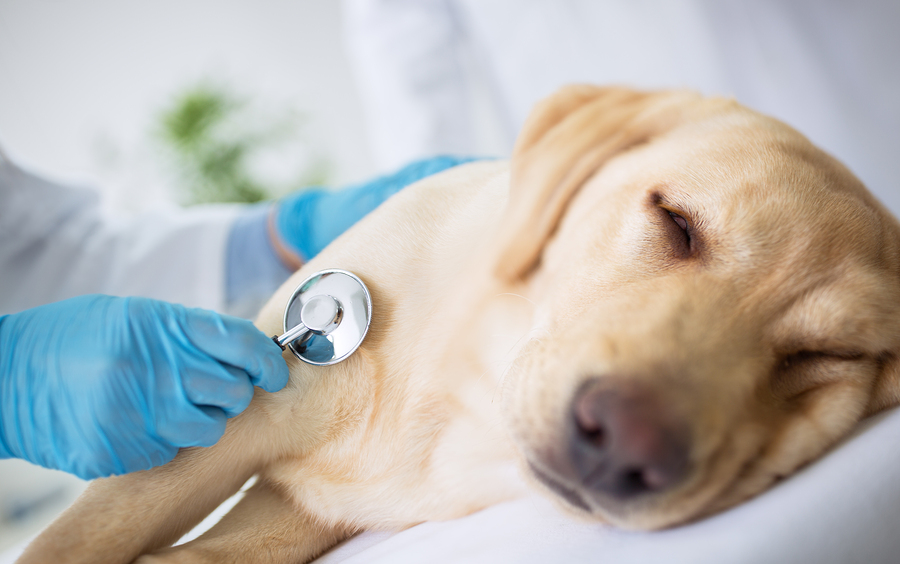
This post may contain affiliate links. We are compensated for referring customers to our affiliate partners.
Kidney disease is an all too common and uncomfortable for senior dogs. Due to the nature of this condition, your dog will require a special diet or dry dog food in order to slow the progression of this disease and keep your dog as healthy as possible.
What Is Kidney Disease?
Kidneys are responsible for removing waste substances from the blood and helping to maintain a normal balance of fluids and minerals within the body. Any condition that causes damage to the kidneys is typically referred to as kidney disease. While some dogs may show early warning signs, most do not show signs until around 75 percent of the kidney’s function has already been lost. If your dog is 7 years old or older, then you may want to have routine blood tests and urinalysis for early detection.
What Can Cause Kidney Disease In Dogs?
There are a wide range of reasons why your dog may have kidney disease including infections, injury, toxins, and cancer. Unfortunately, the damage done by kidney disease is typically irreversible. Kidney disease is fairly common in dogs, but with early detection and treatment, progression of the disease can be limited to allow them to live fairly healthy and happy lives after diagnosis.
The factors that can increase your dog’s risk of kidney disease include:
- Age – After the age of 7, dogs have an increased chance of developing kidney disease.
- Food – Certain dog foods that are high in phosphorus or that have a high level of protein can increase the risk of kidney disease.
- Breed –Certain dog breeds, such as Bull Terriers, English Cocker Spaniels, and German Shepherds, are much more prone to developing kidney disease at some point in their life.
- Chemical Exposure – Exposure to certain chemicals, like antifreeze, lead paint, disinfectants, and types of human medications, can sometimes damage a dog’s kidneys.
What Are The Signs Of Kidney Disease In Dogs?
As mentioned before, it can be rather difficult to recognize the signs of kidney disease in your dog until it has already done a serious amount of damage. However, you should make sure to check in with your local vet if your dog is showing any of the following signs:
- Decreased appetite
- Increased thirst and urine production
- Bad breath
- Sore mouth
- Vomiting and diarrhea
- Weakness
- Increased sleeping
- Lack of energy
- Depression
- Poor coat appearance
When your dog is diagnosed with kidney disease, your vet might describe it as being either acute or chronic.
Acute kidney disease is when kidney disease appears suddenly due to trauma, blood loss, shock, severe dehydration, obstructed urine flow, infection, poisons, or drugs. While still serious, symptoms are more likely to be visible which provides you a better chance for early detention.
However, chronic kidney disease is a result of the above factors as well as nutritional factors, immune defects, breed and hereditary tendencies. Unfortunately, as mention previously, sign do not typically appear until 75 percent of the kidney’s function has been lost.
The Nutritional Needs Of Dogs With Kidney Disease
Even for a perfectly healthy dog, healthy dog food plays a key role in their overall health and well-being. However, if your dog has been diagnosed with kidney disease, you will need to modify their dog food in order to help manage the disease properly and safely.
- Plenty of water – Dogs with kidney disease will have a much greater need for water because their kidneys are more actively trying to eliminate toxins from your dog’s body. Canned dog food is typically preferred due to its naturally high moisture content. However, if you plan to feed them dry dog food, you need to make sure there is plenty of water nearby or soak the dry dog food in water in order to provide your dog with better water intake.
- Reduced protein – This will depend on what stage of kidney disease your dog is in. If it is the early stages, your dog will still need an average amount protein for a healthy diet. For later stages will need a much lower level of protein as protein could build up in the kidneys and worsen their condition.
- Increased fat and carbohydrates – Despite the decrease in protein, your dog will still need fat and carbohydrates for energy. Additionally, fat and carbohydrates are fairly easy for your dog to digest and will help encourage your dog to continue eating.
- Decreased phosphorus – When the kidneys aren’t working efficiently, they can allow phosphorus to easily build up in the blood. A buildup of phosphorous can lead to a large decrease of function in your kidneys and increase your dog’s risk of kidney failure.
- Less sodium – If the kidneys are struggling to function, some of the hormonal balance related to kidney blood pressure might be off. This can end up leading to mild to modest hypertension and high blood pressure. For this reason, dogs with kidney disease will need to have a much lower level of sodium in their diet.
- More water-soluble vitamins and other antioxidants – Since dogs with kidney disease will need to drink more water and urinate more often, they will also be eliminating some important vitamins too. This is why most prescription diets for dogs with kidney disease will have increased amount of these commonly deficient vitamins to make up for what is lost. Additionally, antioxidants will be important for managing cell damage and boosting their immune system.
- High amounts of omega-3 fatty acids – Omega-3 fatty acids, such as those found in fish oils, are great for reducing blood pressure and kidney inflammation. Additionally, these can help to improve blood flow and your dog’s overall kidney health. While this are sometimes present in prescription kidney food, they may not be in high enough amounts. You should ask your vet if a supplement would be best.
